
Save the Date: Postgradaute Research Conference

Latest research and knowledge exchange news at Bournemouth University

Jeffrey Wale (FMC) has won a place on the Law in Context Early Career Workshop organised by the Centre for Socio-Legal Studies at the University of Oxford in September 2019. This followed an open competition involving PGRs submitting their PHD thesis in 2019. Ten applicants were chosen to participate and the best papers from the workshop will be considered for publication in the International Journal of Law in Context. Jeffrey will be presenting his doctoral research titled Regulating Medical Decision-Making: A Qualitative Study of Fetal Reduction in Multiple Pregnancy.
The Parliamentary Office of Science and Technology (POST) run several fellowship schemes, a number of which are open to post-doctoral researchers. There are currently two fellowship roles with open applications.
These are 3-4 month placement fellowships, to experience working within a research and policy environment.
You can read the experience and viewpoints of outgoing POST intern, Fabiola Creed, here.
On Thursday 4 July CsJCC and NRG supported a one-day workshop that demonstrated and explored database use in Humanities Research. This was a two-part day that aimed to introduce participants to the possibilities of this approach, and then moved to discuss potential collaborative projects. It was attended by FMC colleagues and doctoral students researching multiple subjects (including English, Marketing, Advertising, Law, Journalism, Computer Animation, and Radio), and two external scholars.
Ian Stephenson (Senior Lecturer in Computer Animation and Faculty Data Champion) led the morning session, a gentle introduction to using standard query language (SQL) to ask complicated questions of multiple existing data tables. Research generates data, either during primary research or in the form of meta-data where we annotate and organise existing media. While simple notetaking can work at first, greater structure often becomes necessary as projects grow and evolve. Ian demonstrated how small, free programmes such as Postgres can easily be installed (without cost) on a laptop, providing the same power and flexibility as that of commercial datacentres to store and organise essentially unlimited amounts of data. This allows data to be securely stored, well organised, and shared between researchers, allowing us to ask new questions of the data, beyond the scope of the initial investigation.
This workshop grew out of Ian’s development of Julia Round’s database of Misty stories (available at www.juliaround.com/misty). Julia’s project explores the nature of the stories in the British girls’ comic Misty, and also contains supporting information on their creators, origins, and so forth (courtesy of online communities of scholars and fans). Her online database is searchable and will help interested readers find information on these things, but by its nature it’s not capable of asking more complicated questions. Ian developed this research into a relational database or series of interlinked tables, each focused around a subject such as stories (type, length, themes, character, etc), people (artist, writer, letterer, colourist, editor, etc), publication details (title, co-title, issue date, price, cover image, tagline, free gift, etc.), and so forth.
SQL thus enables us to ask questions that link all of this information. For example:
– In what months were new titles launched?
– When did price hikes take place and how does this look if adjusted for inflation?
– How long did merged comics titled usually last?
– Were boys and girls titles different in terms of pricing, story length, or other factors susceptible to numerical analysis?’
– Which artists’ work appeared on the covers most frequently?
– Which artists’ work appears in the internal colour (centre) pages most frequently?
– Which writers and artists most frequently worked together?
In his brief demonstration, Ian showed us some interesting statistics on a number of subjects. These included identifying patterns in story crossover points, i.e. where serials overlapped; the price rises in comics (which prior to the 1980s were not significant in the context of inflation and as compared to newspaper periodicals); and that almost all new titles were launched in February or at the end of the summer. In this way, participants saw how reconstructing simple spreadsheet data as a relational database allowed it to be expanded, interrogated and repurposed. By sharing such datasets, the borders of existing research projects can be extended and interdisciplinary and collaborative projects can be taken to new levels.
The afternoon session invited interested participants to discuss how we might collaborate on developing such a project. Discussion points included a review of what is out there already (sites such as the Grand Comics Database, Jinty blog, Girls’ Comics of Yesterday, Great News for All Readers, Down the Tubes, and so forth), and identification of what these sites do and don’t offer. It was felt that even the most inclusive sites such as the GCD don’t allow complex searches and that most sites/blogs are set up with a singular aim in mind. We thus agreed there was a demonstrable need for a live shared resource that would provide students, researchers and fans with access to a much wider dataset along with the ability to ask complex, interlinked questions of this data.
We were lucky enough to have a brief discussion with a colleague from the Law Department who advised us on copyright issues when including quotations and images, and also IP rights when incorporating data gathered by other people or the templates created to contain this. Images in particular will need to be kept within private circulation and database rights will need to be explored further to ensure we have the correct permissions from contributors.
To develop this project, first steps will be to find some server space to host this dataset. In the longer term, we will reach out to the academic and fan communities for the spreadsheet data currently held by individuals, using our existing networks and also through conference presentations demonstrating the value of this potential resource. Later steps will include expanding the scope of the database to a global level, and developing tools to allow contributors to directly add data, via funding bids or other initiatives.
The proposed database has clear benefits as a data discovery tool, with a demonstrable need from the community of comics scholars at multiple levels. It will have impact as a teaching aid and a source of primary data that will lead to research outputs.
Although after the frantic weeks in early Spring we seem now to be in a political limbo, when nothing is achieved except an escalation in rhetoric and an increase in polarisation, actually, there’s quite a lot going on. Some of it looks like political legacy building, but hey, if it works…
BU is gathering views internally on the consultation “Make it Public” by the Health Research Authority. Responses to an internal survey will inform BU’s institutional response.
The HRA’s consultation gives everyone involved an opportunity to influence the Health Research Authority’s future strategy to improve public access to information about health and social research in the UK. Please read the strategy before you answer the questions.
The BU survey is anonymous, however we have asked about your role at BU to inform our response. We have taken the content and questions directly from the HRA’s consultation. Please take time to complete it if you have experience in this area.
The Minster has announced a new body to speak out for students with disabilities…or actually, has renamed an existing group and confirmed he supports its work. Chris Skidmore announces new Commission to improve support for disabled students: 27th June 2019. The OfS is setting it up: [The Minister] ”has instructed the Commission to identify and promote good practice which helps those with disabilities have a positive experience at university. The Commission, formerly Disabled Students’ Sector Leadership Group (DSSLG), will use the DSSLG’s existing guidance for providers on supporting disabled students inclusively and look at what more needs to be done.”
Universities Minister Chris Skidmore said:
All those who backed Boris on the basis that he would flunk a hard Brexit (eg George Osborne at the Evening Standard) seem to have their bluff called. This week Boris Johnson has written to Jeremy Hunt saying that leaving on 31st October is a “do or die” thing. So it looks like he has been nobbled by the Brexiteers , perhaps spooked by the reaction stories of his private life into thinking that his lead with the membership was slipping away. He looks pretty committed now. But he has also made lots of speeches suggesting it is all going to be very straightforward….(there’s a million to one chance of not getting a deal, apparently).
Jeremy Hunt meanwhile has refused to make such a robust commitment but continues to challenge Boris on a number of fronts and to present himself as the experienced negotiator.
Both of them sound like the US President from time to time. And they are both making huge spending commitments. They were both at the Pavilion on Thursday evening, and the local news showed Boris giving BU a tiny plug and also repeating his commitment (as we noted last week) to removing international students from the immigration cap.
Last week we talked about the possibilities for recess being cancelled – that seems unlikely, so we are likely to have an announcement of the new PM on 22nd July, a frantic couple of days in Parliament and then a recess that will probably end earlier than usual, with EU negotiations taking place in the background – if they can find anyone to negotiate with in what is likely to be a long hot European summer.
Local MP Tobias Ellwood was mentioned on Monday’s Radio 4 Today programme talking about the ‘nuclear’ Brexit option of taking down Boris Johnson’s Government through a vote of no confidence should he intend to push through a no deal Brexit to ensure exit from the EU on 31 October. Tobias states a group of 12 backbencher and ministerial Conservatives are already in talks and prepared to risk their careers, including losing their Conservative candidacy, to bring Boris premiership down if he pursues a no deal Brexit. This would be done either through ministers joining backbencher dissidents to vote against the Government (and party whip) or a larger group of MPs abstaining en masse so the Government loses the vote. Tobias also featured on BBC’s Panorama programme talking about this potential rebellion. If the Government lost a no confidence vote it would pave the way for a general election.
Research England have published the Real-Time REF Review evaluating perceptions and attitudes towards the Research Excellence Framework (REF).
And interestingly:
Home Secretary Sajid Javid formally requested the Migration Advisory Committee (MAC) to review and advise on salary thresholds for the 2021 immigration system. All the details remain as we’ve already informed in previous policy updates, this simply triggers the requirement for the MAC to carry out the review (again) and report back to the Government in January 2020.
Sajid stated: “It’s vital the new immigration system continues to attract talented people to grow our economy and support business while controlling our borders. These proposals are the biggest change to our immigration system in a generation, so it’s right that we consider all of the evidence before finalising them. That’s why I’ve asked independent experts to review the evidence on salary thresholds. It’s crucial the new immigration system works in the best interests of the whole of the UK.”
In their last review the MAC advised the Government to continue with the existing minimum salary thresholds for the future immigration system. This means international entrants would need to be paid at least £30,000 (for an ‘experienced’ role) and new entrants (including recent graduates) at least £20,800.
The new review asks the MAC to
HEPI have published Free Speech and Censorship on Campus defending free speech in Universities.
In a debate on raising aspirations of secondary school pupils Dr Matthew Offord MP (Conservative) urged the Government not to view academic and technical education routes as two simplistic alternatives. He insisted that permeability and flexibility between different types of learning, throughout the academic journey would be crucial in underpinning increased social mobility and productivity. He also argued that HEIs must develop an understanding of T-levels to communicate entry requirements to prospective students and level 3 providers. He pushed the Government to drive collaboration between schools, universities and local Government. To raise aspirations within school age pupils he set out three elements to be addressed:
Shadow HE Minister Gordon Marsden (Labour) suggested the Government should pursue sustained and dedicated programmes, with children from a much earlier age, and with particular social and ethnic groupings. He also argued for the need to enact a robust, independent and wide-ranging review of admissions processes to higher education, removing unconditional offers and investigating the value of post-qualification admissions.
Nick Gibb (Minister for School Standards) stated “For the good of our economy, we need more young people to pursue degrees and careers in the sciences, including computer science. We have already seen excellent progress, with entries to STEM A-levels increasing by 23% since 2010”. The Minister reassured members that views expressed during the debate had been taken into account as part of the Post-16 review process.
Q – Sir Mark Hendrick: To ask the Secretary of State for Education, with reference to the report by the Higher Education Policy Institute entitled Pressure Vessels: The epidemic of poor mental health among higher education staff, what assessment he has made of the reasons behind the increase in poor mental health among academics and the increasing numbers of university staff being referred to counselling and occupational health services.
A – Chris Skidmore:
The Learning and Work Institute has published Tomorrow’s World – Future of the Labour Market highlighting the shifts in employment culture and adaptive skills that young people will need for the future labour market. It suggests that young people will be increasingly likely to be self-employed, in busier jobs, need to adapt and more frequently update their skills because of the pace of technological changes and their longer working lives (50 years due to higher retirement age).
Some points from the report:
Young people will need a rising bar of skills needs and a wider pool of skills to enter and progress at work and to adapt to change. Changes in sectors and occupations, coupled with changes within existing jobs, imply an increased demand for interpersonal skills, cognitive skills, customer and personal service, English language, literacy, numeracy, digital, communication, team working, and management.
Stephen Evans, Chief Executive of the Learning and Work Institute, stated:
“Young people are going to face huge changes during 50 year careers. Attention often focuses on the risk of robots replacing jobs, but further growth in self-employment and changing skills requirements in most jobs could perhaps have bigger impacts. Young people must get the support they need to prepare for this future. It is no good just focusing on the skills needed for jobs today, we also need to give young people the skills they need to adapt to future changes, many of which cannot be predicted accurately.”
The Sutton Trust has published Elitist Britain 2019.
The nature of Britain’s ‘elite’ is higher in the national consciousness than ever, with a series of events, including 2016’s vote to leave the European Union, putting a focus on the strained trust between significant sections of the population and those at the highest levels of politics, business and the media.
Social mobility across the UK is low and not improving, depriving large parts of the country of opportunity. This contributes strongly to this sense of distance. This study, conducted for the first time by both the Sutton Trust and the Social Mobility Commission, looks at the backgrounds of around 5,000 individuals in high ranking positions across a broad range of British society, and provides a definitive document of who gets to the top in Britain in 2019.
The report paints a picture of a country whose power structures remain dominated by a narrow section of the population: the 7% who attend independent schools, and the roughly 1% who graduate from just two universities, Oxford and Cambridge.
Key findings:
However:
Access to professions
Policy recommendations from the report:
Sir Peter Lampl, Chairman of the Sutton Trust and the Education Endowment Foundation, stated:
“Britain is an increasingly divided society. Divided by politics, by class, by geography. Social mobility, the potential for those to achieve success regardless of their background, remains low. As our report shows, the most influential people across sport, politics, the media, film and TV, are five times as likely to have attended a fee-paying school.
“As well as academic achievement an independent education tends to develop essential skills such as confidence, articulacy and team work which are vital to career success. The key to improving social mobility at the top is to tackle financial barriers, adopt contextual recruitment and admissions practices and tackle social segregation in schools. In addition, we should open up independent day schools to all pupils based on merit not money as demonstrated by our successful Open Access scheme.”
The Association of School and College Leaders released this statement:
“We need to do many things to break this cycle but a good start would be for universities and industry to do more to recognise the background of candidates through the greater use of contextual recruitment and admissions practices, as the report recommends.
The government have published the Tourism sector deal – the latest in a string of sector specific plans linked to the Industrial Strategy. They have also published an International Business Events Action Plan outlines how government will support the events industry in attracting, growing and creating international business events.
We have pulled out the actions from the sector deal below:
People
Sector action to support tourism
Places
Sector action to support tourism
Business Environment
Sector action to support tourism
Infrastructure
Sector action to support tourism
Ideas
Sector action to support tourism
Action plan
“The Action Plan lists a set of criteria that events will need to meet in order to qualify for the UK Government’s support. This includes criteria on the minimum number of delegates and the proportion of those travelling from overseas. It then outlines the UK Government’s support offer across a number of areas. Key actions include:
Life Transition Point Learning: The Learning and Work Institute published Learning at Life Transitions focussing on the importance of understanding the needs of adult learners particularly at the key points in their lives when they might be more or less likely to take up learning opportunities. In particular, these points can be parents returning to work after caring for young children and also people preparing for retirement.
Transition back to work after caring for children:
Transition into and through retirement: Participation in, and decisions about, types of learning opportunities alter as adults retire. Although participation in learning tends to decline with age, those approaching retirement have higher levels of participation than the national average.
The report’s recommendations for Policy:
Dame Ruth Silver, President of the Further Education Trust for Leadership
The changing nature of work and of retirement mean that these transitions are changing in nature and need to be rethought. People are more likely to move between jobs, or to need to re-skill or up-skill, than they were 20 or 30 years ago. They are also much more likely to continue working after ‘retirement’, or to seek different ways of combining work and life, and not only when approaching the sort of age traditionally associated with retirement. Transition is increasingly a part of our everyday life; an ongoing consideration.
The leaders of every general further education college in England have written an open letter to the Chancellor and Secretary of State for Education urging them to “answer the calls from business” and respond to the “challenges of technological change and Brexit” by urgently investing in the country’s technical and vocational education system by implementing the main recommendations of the government’s recent Post-18 Education Review. The Augar Review called for, amongst other things, an end to the 17.5% cut in education funding for 18-year-olds, support so that everybody, regardless of age, to achieve to at least level three, and a rebalancing of the traditional post-18 educational landscape.
David Hughes, Chief Executive of the Association of Colleges said: It is extraordinary to have every leader in every general further education college in the country collaborate like this. But then these are extraordinary times. These college leaders are uniquely placed at the hearts of their communities, working closely with local, national and international business, supporting individuals to get on in life, and driving the social mobility agenda. Government needs to listen to them if they’ve got any chance of tackling the major issues this country faces, now and in the future.
Welsh Digital Skills: the Welsh Government have published a strategic framework for post-16 digital learning to increase the continuity of learning experiences and transition from compulsory to post-compulsory learning provision. Vision and aims:
Kirsty Williams, Welsh Education Minister, stated: Our Economic Action Plan highlights the importance of businesses adapting to the opportunities and the challenges presented by new technologies in order to grow the Welsh economy and pursue our aim of prosperity for all. We can’t predict exactly how technology will evolve over the next decade, but we can equip our post-16 learners with the confidence and capability they will need to use digital tools in their work and their everyday lives.
The British Academy published a YouGov Poll revealing the nation’s favourite school and university subjects. The study, entitled, ‘a nation of enquiring minds’ reveals that:
The report finds that arts, humanities and social sciences (AHSS) graduates look forward to strong employment prospects. It states AHSS graduates are as likely to have a job, as resilient to economic downturn, and just as likely to avoid redundancy as STEM graduates. However, AHSS graduates are more flexible (more likely than STEM graduates to voluntarily change job or sector).
Professor Sir David Cannadine, President of the British Academy, said: “The humanities and social sciences help us to make sense of the world in which we live so it is little wonder that the desire to study these subjects at school and university is so great. We not only love the humanities and social sciences in the UK but we also excel at them. Graduates from these disciplines are highly employable and able to weather the changes of a fluctuating job market, while our researchers are disproportionately successful in international funding competitions, punching well above their weight on the world stage.
To subscribe to the weekly policy update simply email policy@bournemouth.ac.uk
JANE FORSTER | SARAH CARTER
Policy Advisor Policy & Public Affairs Officer
Follow: @PolicyBU on Twitter | policy@bournemouth.ac.uk
Information for Postgraduate Research Students & Supervisors
The Researcher Development Programme (RDP) Brightspace unit has been refreshed. This should make accessing resources and workshops quicker and easier. So what’s changed?
The feedback form remains live. It is always valuable to hear your thoughts and views on all aspects of the RDP to ensure its meeting your needs.
The new RDP brochure is currently in design and will be available (in print and PDF) from early September; the new design will reflect these Brightspace updates. Workshop dates and times will also be released in early September and ready to book.
Although RDP workshops have finished for this academic year, you still have access to all online content including the 18 research skills masters programme online modules, the new Video Arts e-learning and videos and much more online content.
If you have any questions regarding your researcher development or the resources available to you, please contact me on pgrskillsdevelopment@bournemouth.ac.uk.
Best wishes, Natalie.
Chloe Casey is a first year PhD student from the Faculty of Health and Social Sciences who is researching the mental wellbeing of postgraduate researchers (PGRs). Research suggests that the prevalence of poor mental health is higher in PGRs than in other student populations or the highly educated general public, yet few researchers have implemented interventions to promote wellbeing in doctoral students. We follow Chloe as she attends her first academic conference in Brighton: The UK Council of Graduate Education’s first annual conference on the Mental Health and Wellbeing of Postgraduate Researchers, where she presented with her supervisor, Dr Steve Trenoweth.
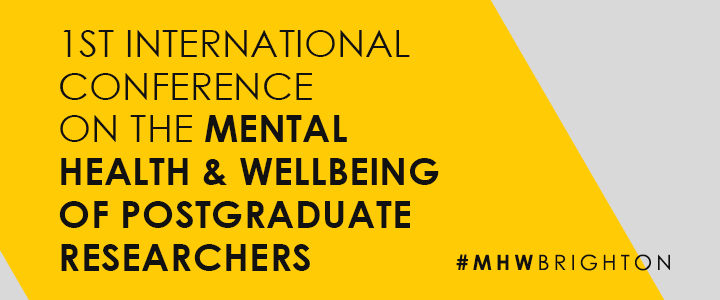
05.59
En route to Brighton from Bournemouth on the earliest train I have ever boarded. I thought I would do some work to distract myself from worrying about the presentation, whether I’ve chosen the right outfit or if people will think I’m smart enough to be there!
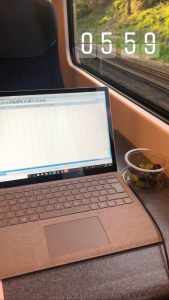
11.57
I don’t know what I was panicking about, everyone from professors to other PGRs were really open and willing to learn from each other. Apart from my initial worry: ‘is everyone in the world researching the same topic as me?!’ I realised that although there were consistent themes we all seem to be approaching the issue using different methods.
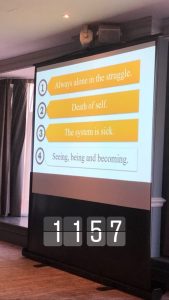
13.52
A conference highlight for me was listening to John de Pury from Universities UK discuss their wellbeing strategies through the PGR lens. There was a real sense that the HEI sector and policy makers are starting to take note that PGRs aren’t the same as other students and need support tailored to their needs.
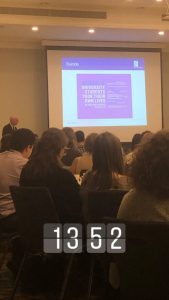
14.39
The break-away sessions were a great opportunity to network with other researchers and HEI professionals in smaller groups. As a PGR myself, my favourite session was ‘Fail again, fail better’, celebrating failure as a wellbeing intervention for doctoral students. Research is a rollercoaster, it’s exploratory, frustrating and rewarding. We should honestly share our ups and downs with others, not to normalize struggle, but engage with failure as a positive, learning process.
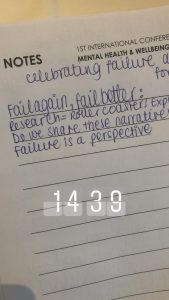
21.08

10.21
I loved the use of a life grid in a research project from the University of Lincoln; it visually showed the highs and lows of doctoral study and what we all experience as PGRs.
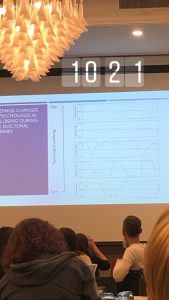
14.15
Our presentation of Steve’s study results was well received and I heard some really useful feedback about my research proposal. Dr Gill Houston from UKCGE chaired our session and said we should come back to present the results of my research in 2020. I’m so glad my supervisor provided me with the opportunity to practice presenting and to promote my own research. I’ve had the chance to exchange ideas and build relationships with some great contacts.
17.21
I’m so glad I took the time out of studying to attend the conference, the experience was invaluable. It’s reassuring to know as a researcher that you are working in an exciting, up-and-coming topic area, but also as a doctoral student to hear the collaborative efforts of the HEI sector, policy makers and researchers to promote wellbeing and encourage a positive postgraduate research experience.

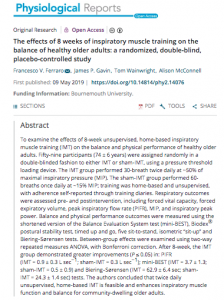 The article titled “The effects of 8 weeks of inspiratory muscle training on the balance of healthy older adults: a randomized, double-blind, placebo-controlled study” has been published by Physiological Reports.
The article titled “The effects of 8 weeks of inspiratory muscle training on the balance of healthy older adults: a randomized, double-blind, placebo-controlled study” has been published by Physiological Reports.
It is the first research to describe the effects of inspiratory muscle training (i.e. breathing exercises that improve the strength of inspiratory muscles) on static and dynamic balance (measured with the clinical tool mini-BEST) and functional mobility (such as Timed Up and Go and 5 sit to stand tasks) with community dwellers older adults (aged 65+).
The research is part of Francesco Ferraro PhD journey. Journey guided with the supervision of Professor Alison McConnell, Dr James Gavin and Tom Wainwright
The article is now fully available as open access here
https://doi.org/10.14814/phy2.14076
To examine the effects of 8‐week unsupervised, home‐based inspiratory muscle training (IMT) on the balance and physical performance of healthy older adults. Fifty‐nine participants (74 ± 6 years) were assigned randomly in a double‐blinded fashion to either IMT or sham‐IMT, using a pressure threshold loading device. The IMT group performed 30‐breath twice daily at ~50% of maximal inspiratory pressure (MIP). The sham‐IMT group performed 60‐breaths once daily at ~15% MIP; training was home‐based and unsupervised, with adherence self‐reported through training diaries. Respiratory outcomes were assessed pre‐ and postintervention, including forced vital capacity, forced expiratory volume, peak inspiratory flow rate (PIFR), MIP, and inspiratory peak power. Balance and physical performance outcomes were measured using the shortened version of the Balance Evaluation System test (mini‐BEST), Biodex® postural stability test, timed up and go, five sit‐to‐stand, isometric “sit‐up” and Biering–Sørensen tests. Between‐group effects were examined using two‐way repeated measures ANOVA, with Bonferroni correction. After 8‐week, the IMT group demonstrated greater improvements (P ≤ 0.05) in: PIFR (IMT = 0.9 ± 0.3 L sec−1; sham‐IMT = 0.3 L sec−1); mini‐BEST (IMT = 3.7 ± 1.3; sham‐IMT = 0.5 ± 0.9) and Biering–Sørensen (IMT = 62.9 ± 6.4 sec; sham‐IMT = 24.3 ± 1.4 sec) tests. The authors concluded that twice daily unsupervised, home‐based IMT is feasible and enhances inspiratory muscle function and balance for community‐dwelling older adults.

 Over the past decades interdisciplinary or multidisciplinary research has grown in popularity. REF2021 promises that all types of research shall be assessed on a fair and equal basis, including interdisciplinary and collaborative research. New to REF 2021 compared to REF2014 is the Interdisciplinary Research Advisory Panel (IDAP) which has been established to advise the REF team and panel chairs on interdisciplinary research. Furthermore, REF2021 will: (1) appoint at least two members to specifically oversee the assessment of interdisciplinary research in each UoA (Unit of Assessment) to ensure equitable assessment; (2) allow universities to flag-up outputs in the submission system with an ‘interdisciplinary identifier’; and (3) require an discrete section in the environment template on the submitting UoA’s structures to support interdisciplinary research.
Over the past decades interdisciplinary or multidisciplinary research has grown in popularity. REF2021 promises that all types of research shall be assessed on a fair and equal basis, including interdisciplinary and collaborative research. New to REF 2021 compared to REF2014 is the Interdisciplinary Research Advisory Panel (IDAP) which has been established to advise the REF team and panel chairs on interdisciplinary research. Furthermore, REF2021 will: (1) appoint at least two members to specifically oversee the assessment of interdisciplinary research in each UoA (Unit of Assessment) to ensure equitable assessment; (2) allow universities to flag-up outputs in the submission system with an ‘interdisciplinary identifier’; and (3) require an discrete section in the environment template on the submitting UoA’s structures to support interdisciplinary research.
Many academics from all disciplines can at some point benefit from working with other scholars from other disciplines. Interdisciplinary research can bring new insights and understanding across disciplinary boundaries. Novel interdisciplinary research can transcend disciplinary boundaries to address sophisticated and so-called wicked problems in society. We would argue that some disciplines are more open to interdisciplinary approaches, and we would argue that the discipline of Public Health as a multi-faceted discipline is probably the most interdisciplinary of all.
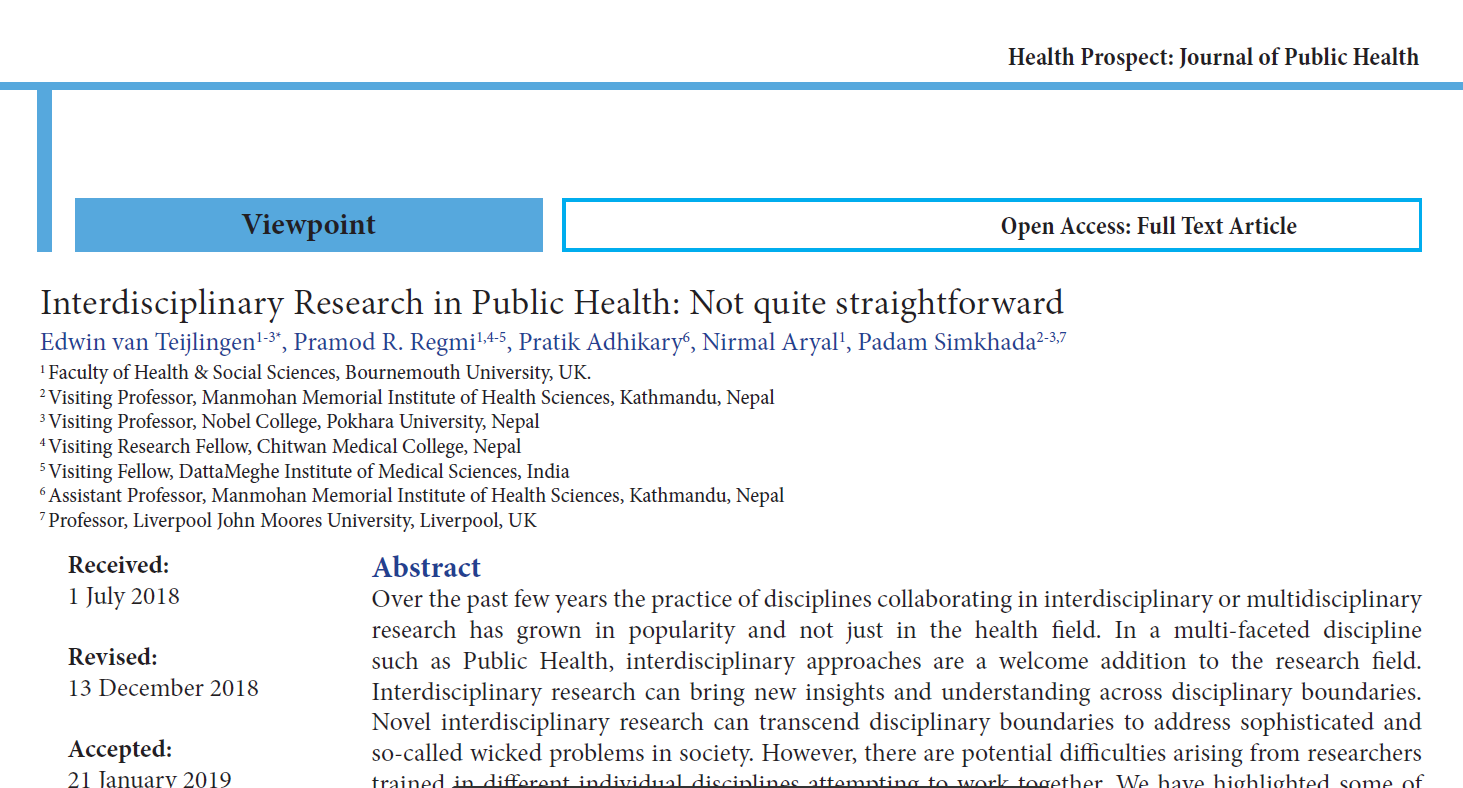
Having decades of research experience between us we also recognize that there can be difficulties arising from researchers trained in different individual disciplines trying to work together. We have highlighted some of these issues which interdisciplinary research in Public Health needs to consider and, where necessary, address before they become barriers in an article published this month in Health Prospect [1]. In this Open Access article we remind the reader that doing interdisciplinary research is not an easy option. Interdisciplinary research may involve a mixed-methods approach and could be underpinned by conflicting, and according to some incommensurable, research philosophies.
We argue, for example that in an interdisciplinary team topic specialists face potentially challenging demands on their range of skills and knowledge. For example, sociologists are required to have a broad knowledge at hand to represent the social science perspective in a study of a disease they know little about, designed by clinicians with a health services research outcome in mind. We also suggest that Public Health researchers have to be versed in both qualitative and quantitative methods. Working multidisciplinary or interdisciplinary means that they have to be able to understand the methods of the epidemiologists (e.g. ‘interrupted -time series’ or ‘nested-case control studies’) and those of health service researchers (e.g. ‘double-blind randomised controlled trials’) and have the whole range of qualitative methods at your command to improve the quality of the overall study.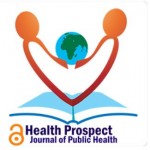
Prof. Edwin van Teijlingen, Dr. Pramod Regmi & Dr. Nirmal Aryal
(all based in the Faculty of Health & Social Sciences)
Dr. Pratik Adhikary &Prof. Padam Simkhada
(both BU Visiting Faculty)
Reference:
You are invited to a half day technical writing workshop where the art of writing successful grants will be unpacked by a successful bid writer who has won them, spoken with the assessors to learn how to win even more of them, and is almost in daily contact with the funder Innovate UK.
After the workshop attendees will have the opportunity to have a one-to-one session with the bid writer to discuss project ideas and to explore suitable grants.
The workshop is being held on Monday 4th March on the Talbot Campus from 09:30 – 16:30. Booking is essential.

2018-01-08T15:37:31Z
Hunter Hines, a PhD student supervised by Dr Genoveva Esteban in the Department of Life and Environmental Sciences (SciTech), has had a piece published by the prestigious journal Nature. Hines is the first author on an article about using social media in microbiology outreach at a global scale. Hunter’s Instagram account @microbialecology currently has 55,000 followers. At the end of 2018 his account received over 1.4 million views in a single week. Around this time this also went viral being picked up by ~30 international media outlets, including National Geographic (Russia). The Nature piece published this week can be read here: doi:10.1038/d41586-019-00493-3
https://www.nature.com/articles/d41586-019-00493-3
Hunter’s Instagram account: https://www.instagram.com/microbialecology
NatGeo Russia: http://www.nat-geo.ru/nature/1249648-snyato-cherez-mikroskop-ili-chto-proiskhodit-v-kaple-vody/
Hunter’s PhD research is on the global distribution of the single-celled organisms known as protists.
Facilitated by Dr Margaret Collins (Training for Universities)
Date: Tuesday 29 January Date: Friday 29 March
Time: 09:30 – 16:30 Time: 09:30 – 16:30
Surveys regularly reveal that public speaking is the most feared business activity and is dreaded even more than death!
Almost every research degree requires you to present your work to colleagues, at meetings, in seminars or at specialist conferences. At conferences, it can also be important to understand how these skills apply to the “business networking” opportunities that present themselves or to have and to use skills to chair a session effectively.
This workshop will begin by exploring the basic components of communication including listening skills, the power of body language, how to make an impact and strategies to hold the attention of your audience.
Participants are invited to deliver a short presentation and to receive coaching and feedback within the supportive workshop environment.
As a result of this workshop participants will:
This workshop will be delivered to meet your specific needs.
To see comments from previous participants please visit: https://trainingforuniversities.com/workshops/presentation-skills.
This workshop is part of the wider Doctoral College: Researcher Development Programme.
Facilitated by Dr Margaret Collins (Training for Universities)
Date: Monday 28 January Date: Thursday 28 March
Time: 13:30 – 16:30 Time: 13:30 – 16:30
Significant keys to success in research include being able to ask the right question, to interpret the data, to see new patterns, to make links between the not-so-obvious associations. These are skills that are developed to provide new and creative answers to your research challenges.
During this workshop we will develop your ability to ask questions, to think outside the box, to see things differently and generate a wider range of possibilities.
We will use a range of techniques including group discussion, group activities and targeted exercises to develop your creative thinking and problem solving skills.
Do come ready to work on your own research ideas, problems or challenges and be prepared to develop some surprising possibilities.
As a result of this workshop participants will
This workshop is part of the wider Doctoral College: Researcher Development Programme.
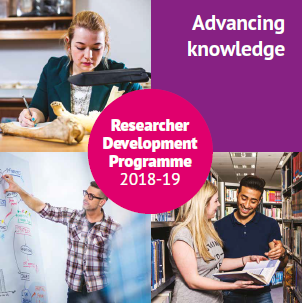
The Doctoral College: Researcher Development Programme would like to present its first monthly update of 2019. The RDP is still here for all PGRs and we have over 80 expertly facilitated workshops coming up between now and August to support your research journey and future career endeavours.
As part of this I am still offering RDP Brightspace training to support navigation around the unit to allow you to optimise its offerings.
As part of the RDP PGRs also have access to the UEA webinar series and the brand new Video Arts videos and e-learning courses.
If you are a PGR or PGR Supervisor and do not have access to the Researcher Development Programme please contact me and I will add you.
To stay up-to-date with regular announcements:
Good Clinical Practice, or ‘GCP’, is a requirement for those wishing to work on clinical research projects in a healthcare setting.
GCP is the international ethical, scientific and practical standard to which all clinical research is conducted. By undertaking GCP, you’re able to demonstrate the rights, safety and wellbeing of your research participants are protected, and that the data collected are reliable.
The local dates for the 2019 Good Clinical Practice full day and half day refresher training are now on the Clinical Governance blog!
Get in touch with Research Ethics to find out how to book.
The HRA have improved the information provided on their website for student researchers and those who support them, in planning to conduct research within the NHS.
The organisation has provided three bite size eLearning modules with a focus on the following topics:
You can see the update here, and access the modules here.
Remember that support is on offer at BU if you are thinking of introducing your research ideas into the NHS – email the Research Ethics mailbox, and take a look at the Clinical Governance blog.

Wednesday 5 December | 13:00 – 16:00 | K103 Kimmeridge House | Talbot Campus
Drop-in to discover this unique display of research being undertaken by our postgraduate researchers. Interact with live displays, listen to recordings and explore a wealth of research posters and photographs.
The Doctoral College look forward to seeing you there.
#PGRLE18
![]()